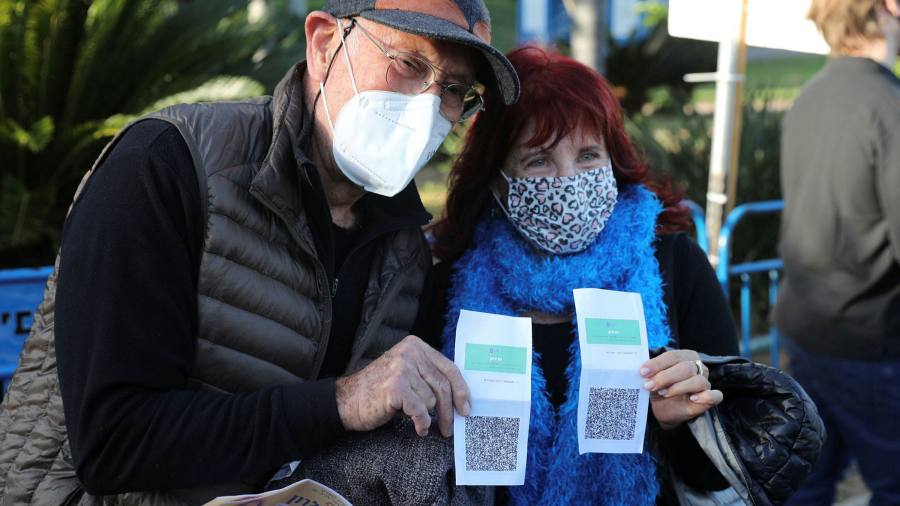[ad_1]
The writer is an FT contributing editor
Of the many questions about a system of vaccine certification — or “passports†— as a path to releasing pandemic restrictions, the most important is that of efficacy: would it work?
If such a policy will not work in practice, then any philosophical and ethical agonising becomes irrelevant, as do concerns about legal risks and dilemmas.
And efficacy is uncertain. Vaccination against coronavirus does not appear to be the same as saying there is no risk of contagion to others. Nor is vaccination necessarily the only reason for a person being immune, if those who have had the virus become immune to it. In these circumstances, certification of having received the vaccine is not proof of safety for others, nor that the vaccine is the only way for someone to become safe from transmitting the virus.
There are also basic questions of policy implementation. Any data-based system is only as good as the correctness of the data input — and any system that carries significant real-world consequences will be prone to being gamed and defrauded.Â
Additionally, a system is only as good as the means of ensuring the veracity of the certificates. Cursory checks will by themselves defeat any programme of authentication. Hard-pressed airport staff are already stating that there is little they can do but accept Covid-19 test certificates at face value.
But assuming a system of vaccine certification is workable, then a new range of difficulties emerges. These are the moral and legal considerations that are engaged by the very nature of certification.
All certification is discriminatory: that is its point. Its function is to provide a basis for a decision maker to make one decision instead of another — that is, to discriminate. This is true whether the certificates are reliable or not. The key moral and legal issues are not so much about reliability, as about the reliance decision makers will place upon the certificates.
For with any policy of certification, direct and indirect consequences will flow from how the passports are used in society and the economy. The inherent discrimination can lead to unfairness and social inequalities.
A person without a certificate may be refused new employment — or even asked to leave their current job. They may be refused the provision of services and denied the same freedom of movement of as others, both domestically and internationally. Already some holiday companies and airlines are mandating vaccine certificates from their customers.
Even if the passports are accurate, there could be many reasons why a person may not have been vaccinated, such as pregnancy or certain health conditions. There may also be reluctance within some ethnic groups. Should all these people be disadvantaged, as a matter of public policy?
If so, then the direct effects of discrimination are compounded by the ripples of indirect discrimination, as entire sections of society become structurally disadvantaged. Certificates will not just show the fact of a vaccination but will also confer privilege.
So what can be done to avoid such unfairness and inequality? The temptation will be to have a system of certificates but not allow decision makers to rely on them. But if, to avoid inequalities, vaccine certification is not determinative of what can and cannot be done in given situations, then what is the point of it?
If certificates are to have no use in decision-making, even if they are accurate, then there is the equal and opposite ethical issue of whether those who are willing and able to participate in certain activities, and can be shown to be safe in doing so, should be prevented from doing so, just because not everyone can join in.
There is no easy way out. Any attempt to couple up vaccination certificates with, say, a system of rapid testing will have the greater problem of needing to have two elaborate systems working properly instead of one. And the more variables in any public policy, the more likely it is to fail.
All these considerations are in addition to fundamental questions for the individual about medical privacy and physical autonomy: our right to control what information is known about us, and to be free from direct or indirect coercion or other pressures to have clinical interventions. Such basic points cannot just be wished away with a clamour for the general good.
Nonetheless, if vaccine certificates are in fact and in practice useful, then a legal basis will be found for them. In public health matters, the law is usually the servant of policy not its master. And in respect of ethical questions, there will be an insistence that the rights of some people are more important than the rights of others.
But the legal and ethical issues are valid considerations, for they reflect the real effects on people both individually and collectively. Vaccine certificates are not a passport out of difficult choices.
[ad_2]
Source link






